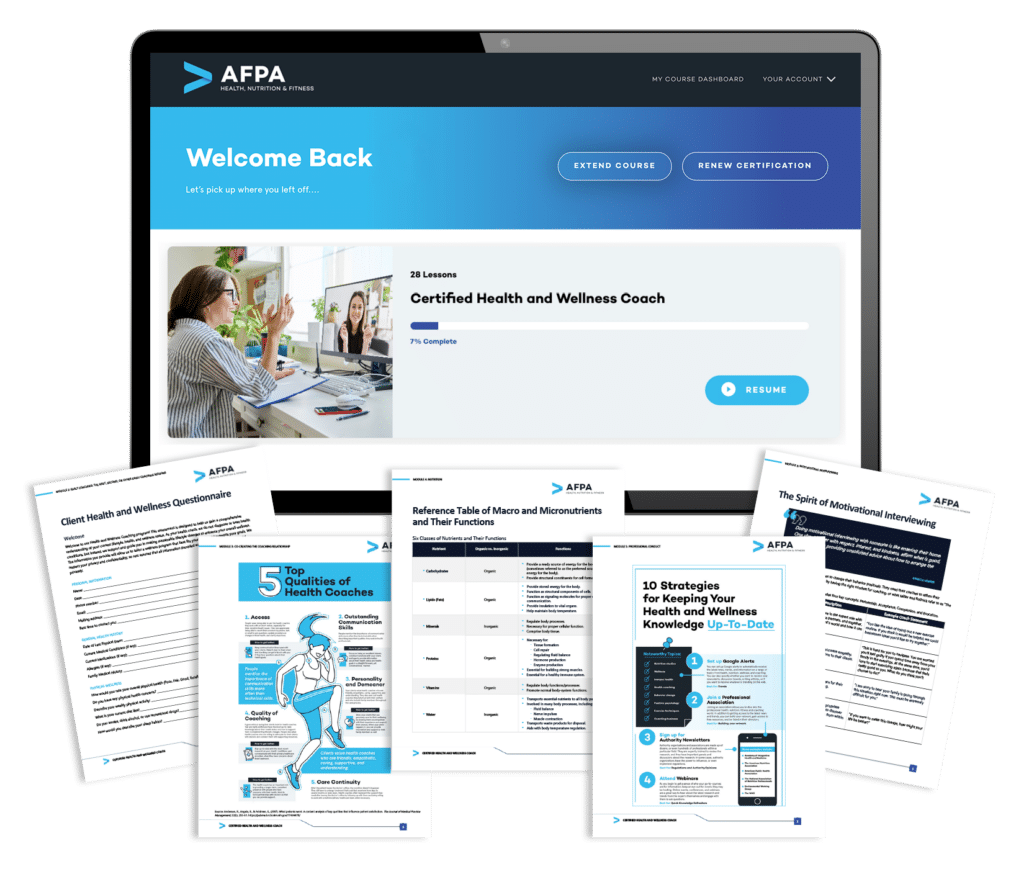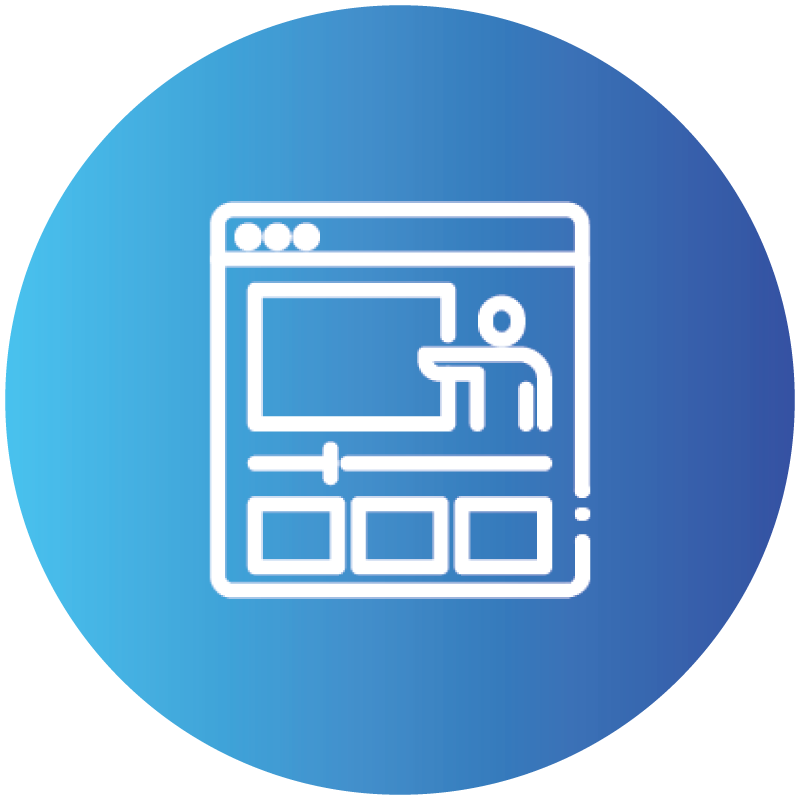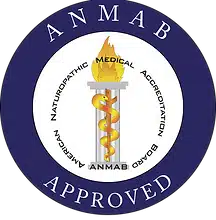Start Your Career as a Certified Health and Wellness Coach in 6 Months or Less
It’s easy to feel stuck or lost when it comes to your health. The confusion of conflicting information and busyness of everyday life can wear you down. If you’ve ever been there, then you probably know how powerful it is when someone helps you get out of that place.
That’s why health coaches are in the business of meeting people where they are and pointing them in the right direction. Sometimes what you need is someone who is a few steps ahead of you on the wellness path to show you the way.
Certified Health and Wellness Coaches are prepared to help others take control of their health and ultimately, their lives.

The AFPA Certified Health and Wellness Coach Program is…

Fresh
We have completely overhauled this program to make it better and more relevant than ever. Our dynamic curriculum will prepare you to meet the needs of today and maximize your impact.

Holistic
This program takes a whole-person approach to well-being. No symptom happens in a vacuum. Certified Health and Wellness coaches know how to zoom out and look at the whole picture.

Flexible
Fit the Certified Health and Wellness Coach program into your life however you need to. Complete your coursework anywhere, at any time, at your own pace. Most students finish in under six months.
Benefits of Becoming a Certified Health and Wellness Coach

The health coaching market is predicted to reach $34.81 billion by 2031. Get AFPA-certified to carve out your space in this growing industry!
As a Certified Health and Wellness Coach, you can:
- Improve your personal health and lifestyle
- Help others achieve their wellness goals
- Create a career that aligns with your passions
- Generate additional income doing something you love
- Be your own boss, maintaining a work-life balance that works for you
- Help bridge the healthcare gap, enhancing the overall effectiveness of healthcare and promote long-term wellness
How Health Coaches Make an Impact
Health and wellness is highly individual, but health coaching skills can be applied across a wide variety of situations. A client may seek out a health coach for many reasons, including the following:
- To improve their diet and feel more control over their eating habits
- To make exercise a priority or add movement to their routine
- For real and effective methods to manage stressors
- For tools to deal with an addiction to drugs or alcohol
- To strengthen other areas of wellness, including spiritual, cultural, or occupational

About the Learning Experience


Dynamic learning methodologies to meet a variety of learning preferences

35+ hours of video content, including simulated coaching sessions

37 handouts to prepare you for real-life application

Interactive scenarios to help you engage with what you’re learning
Meet the Faculty
24 years of experience between our two course creators — professionals who have been there, done that.

Shana Walsh, PhD, NBC-HWC, MCHES

Sasha Aparicio, M.S.
A Look Inside the Curriculum
Module 1 – What is Health Coaching? Answer
- Credentialing for coaches
- The scope of practice for health coaches
Module 2 – Coaching Structure Answer
- Setting up a coaching program
- The early coaching process
- Conducting routine ongoing sessions
- Wrapping up a coaching program
Module 3 – Coaching Process Answer
- Creating a healthy coaching relationship
- Health behavior change theory
- Motivational interviewing for coaches
- Coaching in action. Watch real health coaches conduct coaching sessions.
Module 4 – Whole Person Health Answer
- Non-communicable diseases
- Physical activity and exercise
- Nutrition
- Sleep
- Stress
- Holistic health and wellness
Module 5 – Ethics and Legal Considerations of Health Coaching Answer
- Professional conduct
- Ethical guidelines
- Legal recommendations for coaches
A Sneak Peek into the Online Classroom
Accreditation & Continuing Education

The Certified Health and Wellness Coach Program fully meets the American Naturopathic Medical Accreditation Board (ANMAB) accreditation board educational requirements. AFPA graduates are eligible to apply to become a Board Certified Holistic Health Care Practitioner through ANMAB.

The Certified Health and Wellness Coach Program is approved by AFPA (American Fitness Professionals & Associates) for a total of 16 AFPA CECs.
Let Customers Speak for Us
FAQ
What are the qualifications to enroll in this course? Answer
You must be at least 18 years old to enroll in this course. This ensures that students have reached a level of maturity and responsibility necessary to fully engage in the coursework and professional development opportunities offered throughout the program. We believe that age should never be a barrier to pursuing one’s passion for holistic nutrition, and we welcome individuals from all walks of life who are committed to making a positive impact on the health and well-being of others.
In addition to the age requirement, having a solid understanding of the English language is essential for successful completion of the program because all course materials, lectures, and assessments are conducted in English.
How long does it take to complete this course? Answer
At AFPA, we understand that individuals have different schedules and commitments, which is why this course offers the flexibility and freedom to complete the program at your own pace. Whether you prefer an accelerated study or a more relaxed learning approach, we provide you with ample time to successfully complete the course.
The Health and Wellness Coach course is designed as a self-directed, self-study program, allowing you to tailor your learning experience to fit your individual needs and availability. The course is structured to be completed in six months or less, providing you with a reasonable timeframe to delve into the comprehensive curriculum and absorb the core concepts of holistic nutrition.
However, we understand that some students may require additional time to fully absorb the course content or accommodate unexpected life events. Should you find yourself in need of more time, we offer the option to request a six-month extension for a fee of $75. This extension allows you to continue your studies without feeling rushed or overwhelmed, ensuring that you have the necessary time to grasp the concepts.
We encourage all students to set realistic goals and establish a study schedule that aligns with their personal circumstances. By dedicating consistent time and effort to the course, you can successfully complete it within the initial six-month timeframe or with the additional extension if needed.
Is there an in-person component to this course? Answer
No, this course is 100% online. You can access the online learning platform from your desktop, mobile phone, or tablet, and complete your course from wherever you are.
Are there payment plans? Answer
Select Affirm at checkout to split your purchase into monthly payments starting at 0% APR with no hidden fees.
Pick the loan that fits your budget and make payments over three, six, or 12 months. Our payment plans offer instant approval and are safe and secure.
Does this course require textbooks? Answer
Our Certified Health and Wellness Coach program is administered 100% online through our dynamic learning platform. Additional textbooks are not required.
How is the final exam administered? Answer
The final exam for this course is online, multiple choice, and open-note.
You must score at least an 80% on your final exam to pass. If you don’t pass the final exam on your first attempt, you can request a re-test for an additional fee.
How many CECs is this course worth? Answer
This course provides you with 16 continuing education credits (CECs) that count toward the renewal requirements of an existing AFPA certification. To qualify for CECs, you must successfully complete the certification program.
Is this program NBHWC-accredited? Can I take this course to become board-certified? Answer
In order for the AFPA Health and Wellness Coaching program to be considered accredited by the NBHWC, students need to enroll in this Certified Health and Wellness Coach Program, plus the Advanced Health Coaching Intensive [Live]. We have conveniently bundled these courses together as the Certified Master Health and Wellness Coach Program, an NBHWC-Approved Training Program.
What does it mean to be a National Board Certified Health and Wellness Coach? Answer
Becoming a National Board Certified Health and Wellness Coach (NBC-HWC) signifies that a health coach has met the rigorous standards set by the National Board for Health & Wellness Coaching (NBHWC). This certification demonstrates a high level of proficiency and expertise in the field of health and wellness coaching.
To become an NBC-HWC, health coaches must meet specific requirements established by the NBHWC, including completing a health coaching training program recognized by the NBHWC and passing the certification exam. The certification exam assesses knowledge, skills, and competencies aligned with the NBHWC’s coaching framework.
What is ANMCB Board Certification? Answer
Board Certification is a voluntary process that adds a national level of recognition and shows that a standard of competency as a natural health care provider has been achieved. Graduates of American Naturopathic Medical Accreditation Board Accredited Schools are eligible to apply for Board Certification with the American Naturopathic Medical Certification Board.
The American Naturopathic Medical Certification Board
The American Naturopathic Medical Certification Board (ANMCB) invites you to become Board Certified. ANMCB is a non-profit worldwide organization registered in Washington, DC, that administers certification for natural health care professionals. The mission of the American Naturopathic Medical Certification Board has been, first and foremost, protection of the health and welfare of the public.
ANMCB Certification has proven through the setting of standards over the years, to be the most beneficial tool for recognizing competencies in the Natural Health Care profession. The ANMCB successfully set levels of achievement in the natural health care profession. You will be granted a Board Certification title that reflects your education degree. Those who have attained the ANMCB certification have the personal satisfaction of knowing they have reached a recognized and accepted national level of competency. These benefits include recognition by businesses, professional associates, peers, and the public. For more information ANMCB, visit www.anmcb.org.
What is health coaching? Answer
Health coaching is a dynamic and client-centered approach that aims to empower individuals to make positive and lasting changes in their overall well-being. Health coaches work closely with clients to develop strategies that align with their goals, values, and lifestyle. This collaborative process involves assessing the client’s current health status, identifying obstacles, and creating actionable plans to improve their physical, mental, and emotional well-being. Health coaching encompasses various aspects of wellness, including nutrition, exercise, stress management, sleep, and overall lifestyle choices. By providing support, accountability, and guidance, health coaches help clients navigate their unique health journeys and achieve sustainable results.
What is the difference between a health coach and a nutritionist? Answer
While health coaches and nutritionists both play crucial roles in guiding individuals towards better health, they have distinct areas of focus. A nutritionist primarily focuses on dietary choices, nutritional needs, and educating clients on proper nutrition. On the other hand, health coaches typically take a more holistic approach, considering not only nutrition but also other aspects of wellness. Health coaches explore a client’s lifestyle, habits, mindset, stress levels, and overall well-being to create a comprehensive wellness plan. They support clients in setting and achieving health goals, adopting sustainable lifestyle changes, and addressing barriers beyond nutrition.
Read our full blog on the difference between nutritionists and health coaches.
What is the difference between a health coach and a personal trainer? Answer
While health coaches and personal trainers both contribute to improving individuals’ well-being, their areas of focus and expertise differ. Personal trainers primarily specialize in physical fitness and exercise programming. They provide guidance on proper form, workout routines, strength training, cardiovascular exercises, and overall physical performance. Health coaches, on the other hand, take a more comprehensive approach to wellness. They address various aspects of well-being, including nutrition, stress management, sleep, mindset, and lifestyle choices. Health coaches work collaboratively with clients to establish personalized strategies that encompass not only physical fitness but also overall health and well-being.
How much can I earn as a health coach? Answer
As a health coach, your earning potential can vary based on several factors. While it’s challenging to provide an exact figure, health coaches can earn a sustainable income that aligns with their efforts and expertise. Here are some key factors that influence the earning potential of health coaches:
Experience: As with any profession, experience plays a significant role in determining earning potential. Health coaches who have built a solid reputation, gained practical experience, and established a strong client base often have the opportunity to command higher fees or salaries.
Location: The geographic location in which you practice can influence your earning potential. Urban areas or regions with a higher cost of living may offer greater opportunities for higher fees or salaries compared to rural areas.
Education and Certifications: Holding advanced degrees, certifications, and credentials in health coaching or related fields can enhance your earning potential. Clients value qualifications and specialized knowledge, which can justify higher fees for your services.
Employment Setting: Health coaches work in various settings, including private practice, wellness centers, corporate wellness programs, healthcare facilities, and more. The compensation structure can vary based on the setting. For instance, health coaches in private practice have more control over their rates and earning potential, while those employed by organizations may receive a salary or hourly wage.
Clientele and Services: The type of clientele you serve and the range of services you offer can impact your earnings. Targeting specific populations, such as working professionals, athletes, or individuals with specific health conditions, and specializing in niche areas can lead to higher demand and potential for higher fees.
Marketing and Networking: Proactive marketing and networking efforts are crucial for attracting clients and increasing your earning potential. Building a strong online presence, leveraging social media platforms, attending industry events, and establishing relationships with other health and wellness professionals can help expand your reach and generate more clients.
It’s important to remember that building a successful career as a health coach takes time, dedication, and continuous effort. The earning potential grows as you gain experience, expertise, and a strong reputation within the field. By consistently providing value to your clients and effectively marketing your services, you can create a fulfilling and financially rewarding career as a health coach.
How do I start a career in wellness coaching? Answer
Starting a career in wellness coaching requires a combination of passion, knowledge, and professional training. Here are some steps to help you begin your journey:
Gain foundational knowledge: Start by educating yourself on various aspects of wellness, such as nutrition, exercise, stress management, and behavior change. Read books, attend seminars, and explore reputable online resources to enhance your understanding.
Choose a credible health coaching program: Enroll in a comprehensive and recognized health coaching certification program. Look for programs that cover essential coaching skills, behavior change techniques, client assessment, and practical application. AFPA’s Health & Wellness Coach Course offers a comprehensive curriculum that equips you with the necessary knowledge and skills to excel as a health coach.
Complete the certification program: Successfully complete the health coaching certification program, including coursework, assignments, and practical assessments. This will ensure that you have a strong foundation and are equipped with the skills required to work with clients effectively.
Gain practical experience: Seek opportunities to gain hands-on experience by offering pro bono coaching sessions, volunteering, or interning at wellness centers, gyms, or community organizations. This practical experience will help you refine your coaching skills and build confidence in working with clients.
Build a professional network: Connect with other health and wellness professionals, attend industry events, and join relevant associations or organizations. Networking can provide valuable connections, mentorship opportunities, and potential referrals for clients.
Establish your niche: Determine your area of specialization within wellness coaching. This could be a specific population, such as working professionals, athletes, or individuals with specific health conditions. Focusing on a niche allows you to tailor your services and attract clients who resonate with your expertise.
Launch your practice: Once you feel confident in your coaching skills and have identified your target audience, establish your coaching practice. Create a professional website, develop marketing materials, and use various platforms, such as social media, to promote your services. Start by offering introductory sessions or group programs to attract clients and build your reputation.
Remember, building a successful career in wellness coaching requires dedication, continuous learning, and a genuine passion for helping others. By following these steps and consistently delivering value to your clients, you can embark on a fulfilling and rewarding career in the field.
Where do health coaches work? Answer
Health coaches have the flexibility to work in various settings, depending on their preferences and career goals. Here are some common work environments for health coaches:
Private practice: Many health coaches establish their own private practices, either as solo practitioners or as part of a group practice. This allows for autonomy, flexibility in scheduling, and the ability to tailor services to individual clients’ needs.
Wellness centers and clinics: Health coaches are increasingly being employed by wellness centers, medical clinics, and integrative healthcare facilities. In these settings, health coaches work alongside other healthcare professionals, such as doctors, nutritionists, and therapists, to provide holistic care to patients.
Corporate wellness programs: Many companies recognize the value of investing in employee well-being and have established wellness programs. Health coaches play a vital role in these programs, conducting workshops, offering one-on-one coaching, and supporting employees in adopting healthy lifestyle choices.
Fitness centers and gyms: Health coaches may collaborate with fitness centers and gyms to provide comprehensive wellness services to clients. This could involve designing personalized exercise plans, offering nutrition guidance, and providing overall wellness coaching to support clients’ fitness journeys.
Virtual coaching: Thanks to technology, health coaches can also provide services remotely through virtual coaching platforms. This enables them to work with clients from anywhere in the world, expanding their reach and client base.
Community organizations and nonprofits: Health coaches may partner with community organizations, nonprofits, or government agencies to deliver wellness programs to underserved populations. This allows coaches to make a meaningful impact on the health and well-being of communities.
The specific work environment for a health coach may depend on their niche, target audience, and personal preferences. It’s important to consider your desired setting and align your career path accordingly.
Is it hard to get clients as a health coach? Answer
Attracting clients as a health coach requires proactive marketing and networking efforts, especially in the early stages of your career. While building a client base may present challenges, with dedication and effective strategies, you can overcome these hurdles. Here are some tips to help you get clients as a health coach:
Define your target audience: Identify the specific population or niche you want to serve as a health coach. This could be working professionals, athletes, individuals with specific health conditions, or any other group that resonates with your expertise. By narrowing down your target audience, you can tailor your marketing efforts to reach and appeal to them specifically.
Build a professional network: Networking is crucial for growing your client base. Attend industry events, join professional associations, and connect with other health and wellness professionals. Establishing relationships and collaborations with complementary practitioners, such as doctors, nutritionists, or therapists, can lead to referrals and potential clients.
Offer valuable content: Create and share valuable content that showcases your expertise and provides helpful information to your target audience. This could include blog posts, social media content, videos, or podcasts. By consistently providing value, you can position yourself as an authority in your field and attract potential clients.
Utilize social media platforms: Leverage social media platforms to reach a broader audience. Establish a professional presence on platforms like Instagram, Facebook, LinkedIn, or YouTube. Share informative posts, success stories, client testimonials, and engage with your audience to build credibility and generate interest in your services.
Offer introductory sessions: Provide free or low-cost introductory sessions to potential clients. This allows them to experience your coaching style, understand the value you provide, and decide if they resonate with your approach. These sessions can serve as a bridge to establishing long-term coaching relationships.
Seek referrals: Encourage satisfied clients to refer their friends, family, or colleagues to your coaching services. Word-of-mouth recommendations can be powerful in generating new clients. Offer incentives or referral programs to incentivize clients to refer others to you.
Collaborate with other professionals: Partner with other professionals or businesses in related fields, such as gyms, wellness centers, or nutritionists. Cross-referrals and collaborative projects can help expand your reach and attract potential clients.
Showcase client success stories: Share success stories and testimonials from satisfied clients. Real-life examples of the positive impact you have made can be compelling and encourage others to seek your services.
Remember, building a client base takes time and effort. Consistency, professionalism, and a genuine passion for helping others are key to attracting and retaining clients as a health coach.
Join the business of helping others.
Payment Plans Available Starting at 0% APR
Choose from 3, 6, or 12 months. Instant approval. Safe and secure.






